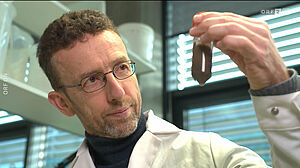How can road salt be made more sustainable? - The ORF science format ‘Mayrs Magazin’ was dedicated to this topic on ORF 2 on 20 December 2024 at 18:29 and also interviewed AIT soil remediation expert Thomas Reichenauer from the AIT Center for Health and Bioresources. He explains the effects that road salt can have on soils and agricultural yields - and why, despite temporary changes, no major damage to common crops has been observed.
To ensure road safety in winter, road salt is a tried and tested means of combating ice and snow. At the same time, however, the saline de-icing agent leads to increased sodium and chloride concentrations in soils adjacent to roads. As measurements in the ‘Salt effects in the soil’ project show, the electrical conductivity and chloride concentration values increase, particularly in the immediate vicinity of the edge of the carriageway. At the same time, sodium in the soil can displace other cations and change the soil structure in the long term. This is feared to reduce yields and impair soil fertility.
Practical trials and monitoring
The actual effects on the soil and plant growth were investigated on the basis of field trials at four locations next to Austrian highways and motorways. The results show that although the chloride and conductivity values are significantly higher immediately after spreading, they fall again after a short time. A slightly increased sodium concentration over the long term also decreased rapidly with increasing distance from the carriageway.
In order to find out what specific consequences this has for agriculture, growth tests were carried out with maize, soya beans and field beans. These represent common crops in the DACH region - from more salt-sensitive to more salt-tolerant plants. The trials showed no significant yield reductions or growth disturbances on soils taken from field margins along motorways and motorways at the end of a littering period.
Soil remediation and sustainable use
Although no serious adverse effects were identified in the fields tested, targeted monitoring of road salt inputs and their long-term effects on soil structure and plant growth remains essential. The AIT is working with the Competence Unit Bioresources on innovative methods for soil remediation and is investigating how negative environmental influences can be mitigated or remedied. The focus is always on combining practical field trials with state-of-the-art laboratory methods to ensure healthy soils and sustainable agricultural production.
Broadcast: The interview with AIT soil remediation expert Thomas Reichenauer was broadcast on ORF 2 on 20 December 2024 at 18:29 and is available on ORF-TVthek until 18 June 2025 at 18:29: https://on.orf.at/video/14256179/mayrs-magazin-wissen-fuer-alle-vom-20122024



